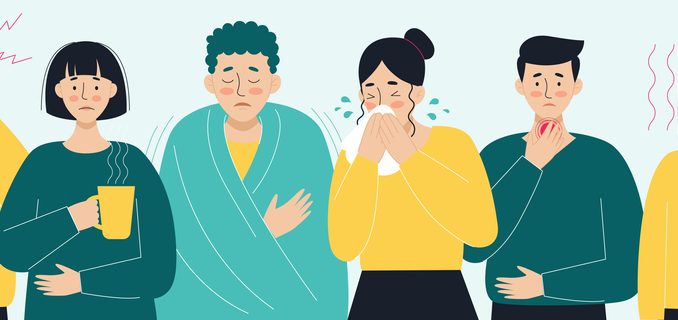As reported by The Independent, rising cases of both covid and norovirus put immense pressure on the NHS, with hospitalisations increasing, creating a challenging winter for healthcare workers, warns NHS national medical director Professor Sir Stephen Powis
New figures show an average of 452 patients were on the wards with the diarrhoea and vomiting bug last week – up 20 per cent from two weeks ago and a third higher than this time last year.
On Covid, the number of patients taking up hospital beds is up by 22 per cent – to 3,949 a day – compared to last month. This is still lower than last year when figures reached more than 6,000 a day.
NHS national medical director Professor Sir Stephen Powis has warned the situation could get even worse, with the cold weather poised to fuel a surge in those being hospitalised.
He said: “These figures show this continues to be a challenging winter, with our staff facing a combination of considerable pressures including winter viruses, high bed occupancy and the knock-on effects from strikes, while this week’s cold snap could see a jump in the number of people needing care.”
“Staff must also contend with continued issues discharging patients who are medically fit due to a lack of social care capacity and a year-on-year increase in ambulances arriving at hospitals.”
Recent data suggests a new and particularly immune-evasive coronavirus variant is responsible for the majority of new cases in England. The JN.1 variant – named “Juno” – was responsible for 62 per cent of the Covid samples sequenced in the final week of 2023, a report by the UK Health Security Agency (UKHSA) revealed last week.
Several hospitals have also been forced to reintroduce mask-wearing due to the increase in Covid and other winter viruses circulating.
Meanwhile, the number of patients in hospital with flu each day last week decreased slightly from 1,548 to 1,416, but is still up from 991 in the last week of December.
Despite the pressures, the number of hours lost to ambulances waiting outside of hospital, which reached record levels last year, is down with 16,554 hours lost last week compared to 28,872 in the week prior.
According to the figures, more people are accessing NHS 111 services with 355,739 calls answered last week – 54,000 more than last year.
However, the NHS continues to struggle to discharge patients. There were 13,637 people in hospital beds each day last week who needed to leave but could not be discharged. This is the highest number so far this winter.
Monthly figures published by NHS England last week showed the number of patients spending more than 12 hours in A&E jumped to 151,000 in December, up from 147,030 in November.
Rory Deighton, director of the NHS Confederation’s acute network which represents hospitals, said: “Winter viruses are continuing to keep the pressure piled onto our hospitals, with NHS leaders and staff working tirelessly to keep patients safe. While it is welcome that performance has not fallen to the levels seen last year, which was the worst on record, no one can deny how challenging this winter has been.
“The slight drop in flu and staff absence levels and improvement in ambulance handover delays are welcome but it is too early to say the NHS is over the hill.”
He warned hospitals still need to rebook thousands of patients who had their operations cancelled during the strikes and that any further spike in demand or new industrial action could throw the NHS off course.



Be the first to comment